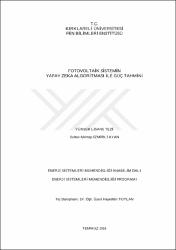| dc.contributor.author | İzmirli Ayan, Sultan Mehtap | |
| dc.date | 2019-04-04 | |
| dc.date.accessioned | 2019-04-04T06:59:49Z | |
| dc.date.available | 2019-04-04T06:59:49Z | |
| dc.date.issued | 2018 | |
| dc.identifier.citation | İzmirli Ayan, S. M.(2018). Fotovoltaik Sistemin Yapay Zeka Algoritmasi ile Güç Tahmini,Kırklareli Üniversitesi Fen Bilimleri Enstitüsü, Kırklareli | |
| dc.identifier.uri | https://hdl.handle.net/20.500.11857/672 | |
| dc.description.abstract | Teknolojik gelişmelerle birlikte, enerjiye olan ihtiyaç giderek artmaktadır. Günümüzde, Dünyadaki bu enerji ihtiyacının büyük bir kısmı fosil kaynaklar ile karşılanmaktadır. Fosil yakıtların doğaya olumsuz etkilerinin olduğu düşünüldüğünde, fosil yakıtların canlılara ve çevremize verdiği zarar giderek büyümektedir. Bu olumsuz çevresel etkenlerden ve bu kaynakların bir gün tükeneceğinden dolayı, yenilenebilir enerji kaynaklarına yönelmek kaçınılmaz olmuştur. Bu kaynakların en önemlilerinden biri olan güneş enerjisinin, fotovoltaik paneller yardımı ile doğrudan elektrik enerjisine çevrilebildiği için enerji ihtiyacını karşılamadaki rolü artacaktır. Yapıl an bu çalışmada, değişen çevresel faktörler göz önünde bulundurularak Fotovoltaik sistemin üreteceği gücün tahmin edilmesi amaçlanmıştır. Çevresel faktörler olarak, radyasyon, panel sıcaklığı, ortam sıcaklığı, rüzgar hızı, rüzgar soğuğu ve nem verileri farklı zamanlarda ölçülerek kaydedilmiştir. Bu veriler ışığında Yapay zeka yöntemlerinden yapay sinir ağlan algoritması ile fotovoltaik panelin üreteceği güç tahmin edilmiştir. Sekiz değişik yapay sinir ağı eğitim algoritması oluşturulmuş, test edilmiş ve başarı sonuçları karşılaştırılmıştır. En düşük ortalama mutlak yüzde hata (MAPE) %6,6 ve başarı oranı (R2 %98,9 olarak tespit edilmiştir. Bununla birlikte fotovoltaik panelin güç tahmininde, yapay sinir ağının performansı istatistiksel tekniklerden Çoklu Regresyon Analizi ile karşılaştırılmıştır. Bu sonuçlar yapay sinir ağlarının, fotovoltaik panellerin ürettiği gücü doğru tahminleme yapabildiğini göstermektedir. Çalışmanın birinci bölümünde; Türkiye Güneş enerjisi potansiyelinden, bölgemizdeki ve ilimizdeki güneş enerjisi potansiyeline kadar, güneş enerjisi istatistikleri araştırmalarla ulaşılan değerler olarak ortaya konmuştur. İkinci bölümde; Güneşten enerji üretiminin yöntemlerinden bahsedilmiş ve bu sistemler detaylandırılarak anlatılmıştır. Üçüncü bölümde; fotovoltaik sistemler, bu sistemlerin yapısı, hücre çeşitleri, sistem çeşitleri, panel performansını etkileyen etmenler gibi konular hakkında detaylı bilgiler verilmiştir. Dördüncü bölümde; yapay zeka bölümünde yapay sinir ağlan ile ilgili bilgiler verilmiş çalışmada kullanılan algoritmalardan bahsedilmiştir. Beşinci bölümde; kullanılan istatistiksel yöntemlerden bahsedilmiştir. Altıncı bölümde ise, deneysel yöntemler ile yapılan çalışmadan bahsedilmiştir. Öncelikle kullanılan FV panelin özellikleri, kullanılan ölçüm cihazları anlatılmıştır. Tahminlemede kullanılacak YSA modeli hakkında bilgiler verilmiş, MATLAB programı kullanılarak geliştirilen yazılım ile ilgili açıklamalar yapılmıştır. Bununla birlikte ve SPSS programı ile yapılan Çoklu Regresyon Analizinden bahsedilerek bu bölüm detaylandırılmıştır. Bu tez çalışmasında, FV sistemde çevresel faktörlerin güce olan etkisi incelenmiş ve ayrıca değişen çevresel faktörlere göre FV panelin üreteceği güç başarılı bir şekilde tahmin edilmiştir. | |
| dc.description.abstract | With the technological advancements, the need for energy is rising. Nowadays this need is mostly met by fossil fuels. When the adverse effects of fossil fuels on the environment are thought, the damage caused by fossil fuels to life and the environment is growing. Because of these negative environmental factors and due to the fact that these sources will be exhausted one day, it is inevitable to turn to renewable energy sources. Solar energy, one of the most important of these resources, will play a pivotal role in meeting energy needs as it can be directly converted to electricity with the help of photovoltaic panels. in this work, it is aimed to estimate the power that the photovoltaic system will produce by considering the changing environmental factors. As for environmental factors, radiation, panel temperature, ambient temperature, wind speed, wind chill and humidity data were measured and recorded at different times. With this data, the power that the photovoltaic panel will generate was estimated by one of the artifıcial intelligence methods, the artifıcial neural network algorithm .. Eight different artifıcial neural network training algorithms were constructed, tested, and their achievement results were compared. The lowest mean absolute percentage error (MAPE) was 6,6% and the success rate (R2 was 98,9%. Moreoever, in the estimation ofthe power ofthe photovoltaic panel, the performance ofthe artifıcial neural networkwas compared with statistical techniques by Multiple Regression Analysis. These results show that artifıcial neural networks can accurately estimate the power generated by photovoltaic panels. in the fırst part of the study; from Turkey' s solar energy potential to our region and our province, solar energy statistics was revealed as values reached by the research. in the second chapter; the methods of solar energy production were mentioned and these systems were explained in detail. in the third chapter; photovoltaic systems, structure of these systems, cell types, system types, factors affecting the panel performance were given in detail. in the fourth chapter; information about artifıcial neural networks in the artifıcial intelligence section were given and the algorithms used in the study were mentioned. in the fıfth chapter; used statistical methods were mentioned. in the sixth chapter, the research done by experimental method was mentioned. Firstly, the properties of the used FV panel and the measuring devices were explained. The information about the YSA model to be used in the estimation were given, and the software developed using the MATLAB program was explained. Furthermore, this section was elaborated with references to the Multiple Regression Analysis done with the SPSS program. in this thesis study, the effect of the environmental factors on power in FV systems was examined and the power to be produced by the FV panel according to the changing environmental factors was successfully predicted | |
| dc.language.iso | tur | |
| dc.publisher | Kırklareli Üniversitesi Fen Bilimleri Enstitüsü | |
| dc.rights | info:eu-repo/semantics/openAccess | |
| dc.rights | Attribution-NonCommercial-NoDerivs 3.0 United States | * |
| dc.rights.uri | http://creativecommons.org/licenses/by-nc-nd/3.0/us/ | * |
| dc.subject | Fotovoltaik Sistem | |
| dc.subject | Yapay Zeka Algoritması | |
| dc.subject | Güç Tahmini | |
| dc.subject | Photovoltaic System | |
| dc.subject | Artificial Intelligence Algorithm | |
| dc.subject | Power Estimation | |
| dc.title | Fotovoltaik Sistemin Yapay Zeka Algoritmasi ile Güç Tahmini | |
| dc.title.alternative | Power Estimation of Photovoltaic System with the Artificial Intelligence Algorithm | |
| dc.type | masterThesis | |
| dc.department | [KLÜ] | |
| dc.relation.publicationcategory | Tez | |





















